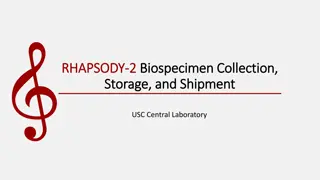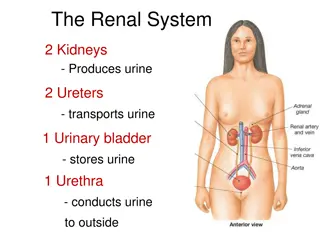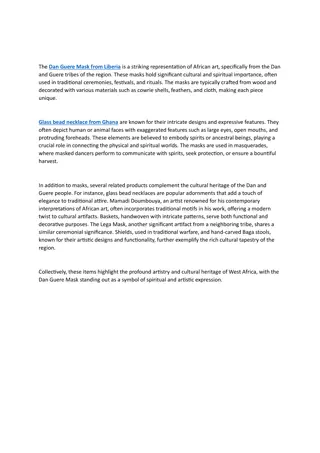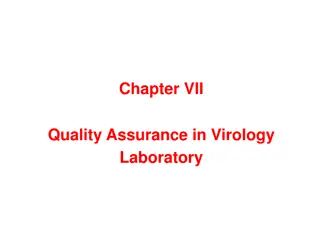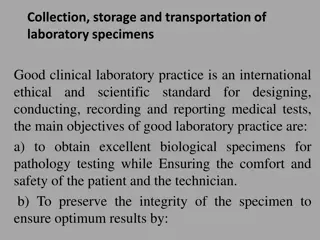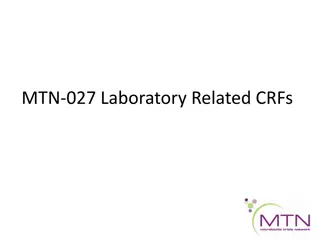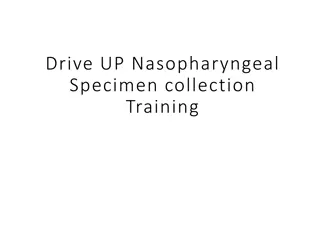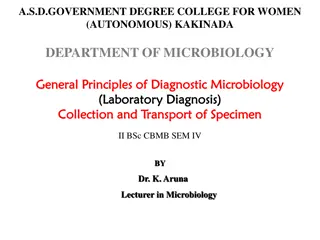Common Laboratory Techniques in Zoology - Urine and Stool Specimen Analysis
In the Biology Department at Al-Mustansiriyah University, students learn laboratory techniques for collecting and analyzing urine and stool specimens. The process involves random urine sample collection, urine tests for chemical components, urine culture, stool specimen analysis for pathological conditions, and precautions for handling specimens properly. These tests help in detecting various health conditions and infections in individuals. The students also learn about ova and parasites collection methods for stool specimens.
Download Presentation

Please find below an Image/Link to download the presentation.
The content on the website is provided AS IS for your information and personal use only. It may not be sold, licensed, or shared on other websites without obtaining consent from the author.If you encounter any issues during the download, it is possible that the publisher has removed the file from their server.
You are allowed to download the files provided on this website for personal or commercial use, subject to the condition that they are used lawfully. All files are the property of their respective owners.
The content on the website is provided AS IS for your information and personal use only. It may not be sold, licensed, or shared on other websites without obtaining consent from the author.
E N D
Presentation Transcript
AL-Mustansiriyah University College of science Biology Dept. Zoology 4thclass Laboratory Technique LAB. (4) NAME : 1
Urine Sample Urine Sample Urine sample collection rules: 1. Random. 2. Clean. 3. make notes for personal health ( male, female) or taking drugs. 4. Tested for: Chemical exam Specific gravity pH Albumin Glucose Microscopic exam Directorate of Laboratory Medicine 2
Common tests done on urine Common tests done on urine 1. UA = urinalysis 2. Urine Culture 1.Urinalysis 1.Urinalysis (normal values) (normal values) pH (4.8-8.0) average 6.0 Protein (none) Glucose (none) Ketones (none) Blood (up to 2 RBC S) Specific gravity (1.010-1.025) WBC S (0-4) Bacteria (none) Casts (none)
2. Urine for C&S 2. Urine for C&S Culture = ? Bacteria growing Sensitivity = which antibiotics are effective Readings after 24; 48; 72 hrs. Midstream Urine Sterile Catheter Specimen (never from bag)
Stool Specimen Stool Specimen Analysis of fecal material can detect pathological conditions for ex: tumors, hemorrhage, infection ..Tests(Pus,Rbc, Ova & Parasites)
Random Collection 1. Universal precaution 2. Collect stool in a dry, clean container 3. uncontaminated with urine or other body secretions, such as menstrual blood 4. Collect the stool with a clean tongue blade or similar object. 5. Deliver immediately after collection
Ova and parasites collection 1. Warm stools are best for detecting ova or parasites. Do not refrigerate specimen for ova or parasites. 2. If the stool should be collect in 10 % formalin or PVA fixative, storage temperature is not critical. 3. Because of the cyclic life cycle of parasites, three separate random stool specimens are recommended.
Sputum Specimens Sputum Specimens Culture Cytology Tuberculosis Collection: Teach to cough effectively .. Not Saliva Keep inside of container sterile Document: color, consistency, odor Early morning specimen


